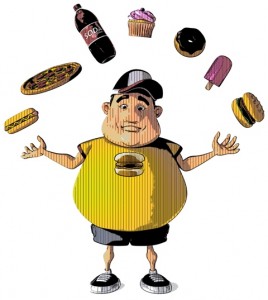The United States has become a nation of overweight children and adults. Lifestyles have changed over the past several decades to the point that convenience has transformed our eating patterns. It is hard to drive down a street and not notice the hordes of fast food restaurants with window signs touting cheap eats. Millions of Americans engage in serial dieting, losing and gaining weight in a seemingly never ending see-saw battle. The key to losing weight and keeping it off requires changing your eating patterns.
It is a very simple yet overlooked concept that calories count. Plain and simple, if you want to lose weight, you must consume fewer calories than you expend. The more you exercise, the quicker your metabolism becomes and the more calories you burn. Many people fail to understand that you make your own metabolism and prefer to adopt the victim mentality that they “have a naturally slow metabolism.” Having a defeatist attitude will get you nowhere. Accept that you must get your heart rate up in order to accelerate your metabolism and the calories you burn.
So, now that you’ve adopted the right attitude, how do you keep your calories in check? We present five tips that will get you started on the road to changing the way you eat and helping you shed those extra pounds.
- Make a commitment – People want to lose weight, but often they are not committed to doing what it takes. Realizing that some sacrifice is necessary is vital. It often helps to put your commitment into writing and posting it somewhere, such as the refrigerator or your car. In writing your commitment, be specific about the reasons you want to lose the weight. Seeing those reasons written on a piece of paper will serve as a reminder of the benefits we will obtain by staying committed.
- Begin keeping a food diary – This is an important step to help you realize how many calories you are actually consuming each day. Many people either do not realize or are in denial regarding how many calories they actually consume. Keeping a food diary takes work, but if you are serious about losing weight, it is essential. Those labels on foods are there for a reason. Even if you eat out, most restaurants have nutrition information posted on premises or available online.
- Eat fewer processed foods – Processed foods tend to be calorie dense. Even a small bowl of potato chips can be more caloric than a grilled chicken breast. By eating fewer processed foods and replacing them with vegetables and lean meats, you will feel fuller while consuming fewer calories.
- Understand your eating patterns – Many of us have poor eating habits that are triggered by certain events. For instance, when stressed, many people will use junk food to help them cope. Others may find it hard to resist that particular favorite fast food joint on the way home from work. By understanding your triggers, you can develop strategies to either avoid them or lessen their negative impact. For example, instead of using junk food as a stress reliever, choose a healthier option, such as substituting an apple instead of a bag of chips.
- Monitor yourself – You may need to consciously monitor your own progress. This means doing more than hopping onto a weight scale. You need to be reflective about how you are doing in terms of improving your eating habits. Like any habit, good eating habits take time to develop and are reinforced by repetition. A good habit, just like a bad habit, becomes second nature over time. By monitoring your own development, you will be more successful in losing weight and better positioned to keep those pounds off.
